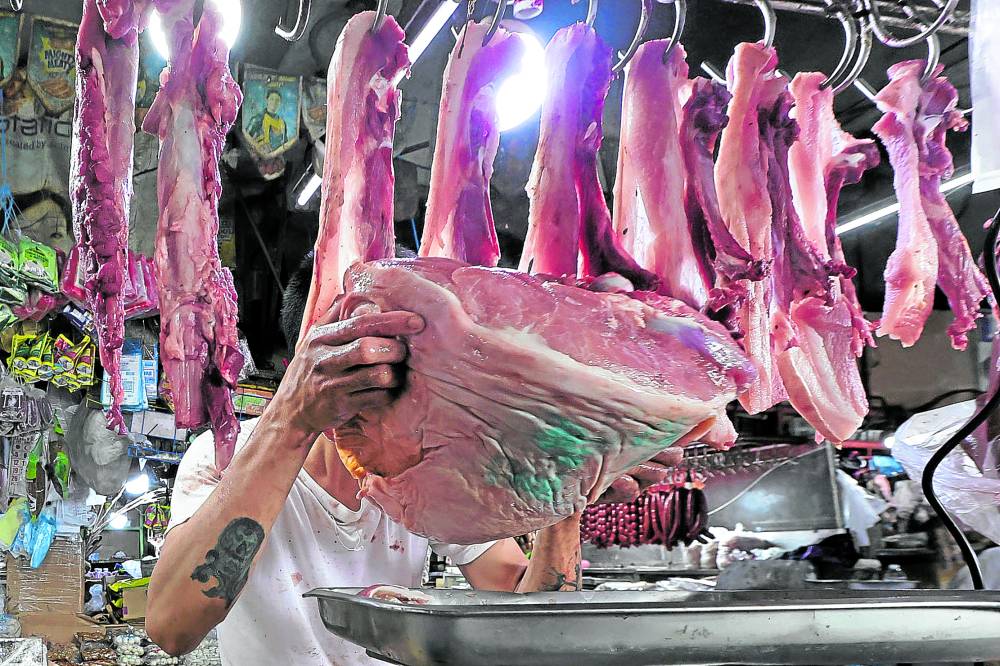DA revising ‘exploited’ pork importation rules

The Department of Agriculture (DA) is revamping a policy that has kept tariffs on pork low for 30 years, claiming that “a small number of accredited importers” have been exploiting the system.
But meat importers pushed back against Agriculture Secretary Francisco Tiu Laurel Jr. and said they should not be blamed for following rules set by the DA itself.
“The licensees who have retained their allocations have all done so in accordance with MAV (minimum access volume) guidelines. We should not fault them for that,” said Jesus Cham, Meat Importers and Traders Association (Mita) president emeritus.
As defined by the World Trade Organization, MAV is a trade mechanism that allows governments to import specific quantities of agricultural products into a country at reduced tariffs.
Cham said the private sector has no mandate to determine MAV-related issues and it only follows regulations set by the government, but he did agree that an increase in MAV is reasonable at this time.
“In order to accommodate more importers, MAV volume should be increased. It has been 30 years after all,” Cham said in a Viber message.
Tiu Laurel said that “our MAV rules were written in 1996 and when I read it, I found a lot of room for improvement. So, we have to revise the MAV.”
According to him, the DA’s Policy and Planning Office “is already on the job” and is expected to finish the revisions by October.
But Cham said the main problem was that the country is simply not producing enough pork, and production has significantly declined since the mid-1990s.
He cited relevant data that pork production reached 1 million metric tons (MT) in 1995, a year before the MAV system was introduced in the country, and peaked at 1.9 million MT in 2019.
“With a production drop of 900,000 tons, Mita proposed to increase the MAV to 500,000 tons. This is still not enough to cover the deficit (900,000 MT),” he added.
The DA initiated the review after discovering that out of the 130 quota holders, 47 of them account for 80 percent of the total allocation, while 22 of those 47 have cornered 70 percent of that volume.
Unequal distribution
“In reality, 22 MAV quota holders account for 55 percent of the total volume,” said Tiu Laurel.
The DA chief also said that many of those MAV quotas are often reused, inflating total import volume, adding: “The sad part about this is that consumers don’t benefit from the reduced tariff.”
To date, the MAV allocation is set at 55,000 MT, with meat processors holding 30,000 MT to ensure lower-priced processed meat.
All pork imported under the MAV scheme is allowed an import duty of 15 percent, compared to the rate of 25 percent for those outside the quota.
Bigger quota
The DA is finalizing the MAV allocation for this year. Initially, it plans to increase the quota for meat processors to 40,000 MT, while the remaining will go to Food Terminal Inc. (FTI) to allow it to stabilize retail prices by intervening in the market.
Selling local and imported pork through the FTI is one of the strategies the DA plans to implement to address rising retail prices.
On March 10, the DA set a maximum suggested retail price (MSRP) on pork—P380 per kilogram for “liempo” and P350 per kg for “pigue” and “kasim.” The price ceiling for a fresh carcass was fixed at P300 a kilo.
In a briefing on Wednesday, Agriculture Assistant Secretary Arnel de Mesa said the compliance rate for MSRP among vendors was at 39 percent for now.

















